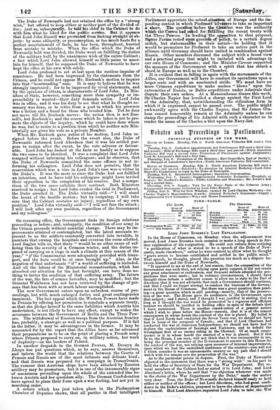On resuming office, the Government finds its foreign relations proceeding
as before; and, unhappily, the condition of our army in the Crimea proceeds without essential change. There may be im- provements attained or contemplated, but the latest accounts re- present to us the soldiers constantly converted into invalids, in numbers that swamp the hospitals and overrun the room allotted. Lord Raglan tells us, that there " would be no other cause of suf- fering than the severity of a Crimean winter, and the duties im- posed of carrying on a siege in such a climate at this season of the year," " if the Commissariat were adequately provided with trans- port, and the huts could be at once brought up." Alas, in the negation of that unfortunate "if" a world of suffering is included. And all the labour of the Ministerial reconstruction, which has absorbed our attention for the last fortnight, can have done no- thing to better the condition of that suffering army. The future of the war, the fate of armies hereafter, may be modified; but the Oriental Walcheren has not been retrieved by the change of per- sons that has been with so much labour accomplished. The new Government enters upon an unbroken course of pro- ceedings, but with much enlarged duties and great contingencies imminent. The last appeal which the Western Powers have made to Prussia by offering her permission to conclude a separate treaty, so that she pledge herself to the same liabilities which Austria has undertaken, is not likely to have any effect, except to widen the severance between the Government of Berlin and the Three Pow- ers. The withdrawal of Russian troops from the Austrian frontier has, probably, a strategic as well as a political purpose. If it fail in the latter, it may be advantageous in the former. It may be accounted for by the report that the Allies have so far advanced their preparations as to be on the point of placing a French army where Prussia proposed to carry on, in military action, her work of duplioity—on the borders of Poland. In another despatch to the German Powers, M. Drouyn de Lhnya has put questions which, as he says, answer themselves, and inform the world that the relations between the Courts of Prussia and Russia are of the most intimate and delicate kind ; and that Russia was prepared for a campaign in Transylvania. The rumour that Austrian ships have been attacked by Russian artillery may be premature, but it is one of the innumerable signs of uneasiness prevailing upon the whole of the extended line be- tween Austria and her quondam ally. The German Confederation have agreed to place their force upon a war footing, but not yet in marching order. A debate which has just taken place in the Piedmontese Chamber of Deputies shows, that all parties in that intelligent
Parliament appreciate the actual situation of Europe and the im- pending contest in which Piedmont advances to take so important a share. The question beforethe Chamber was the authority which the Crown had asked for fulfilling the recent treaty with the Three Powers. In leading the opposition to that proposal, signor Farina rested upon grounds of policy, to a certain degree selfish, but statesmanlike in their nature—he holding that it would be premature for Piedmont to take an active part in the alliance until Germany should have united in combination against Russia. Other members discussed the subject with a broad view and a practical grasp that might be imitated with advantage in our own House of Commons; and the Minister Cavour supported the measure of the Government with a spirit that has struck a chord in Europe as well as in the Chamber. It is evident that in falling in again with the movements of the Allies, our Government will have to conduct its operations upon a larger scale and with an accelerated stride. We must have no more Crimean expeditions to make useless " blows" upon the extremities of Russia, or Baltic expeditions under Admirals that dispute their own orders. At a Mansionhonse dinner this week, Sir Charles Napier has levelled a charge against the First Lord of the Admiralty, that, notwithstanding the ridiculous form in which it is expressed, cannot be passed over. The public might awkwardly agree with Sir Charles Napier, that Sir James Gra- ham cannot honourably remain at the Admiralty unless he can stamp the proceedings of his Admiral with such a character as to render the name of Sir Charles a blot upon the Navy-list.


































 Previous page
Previous page